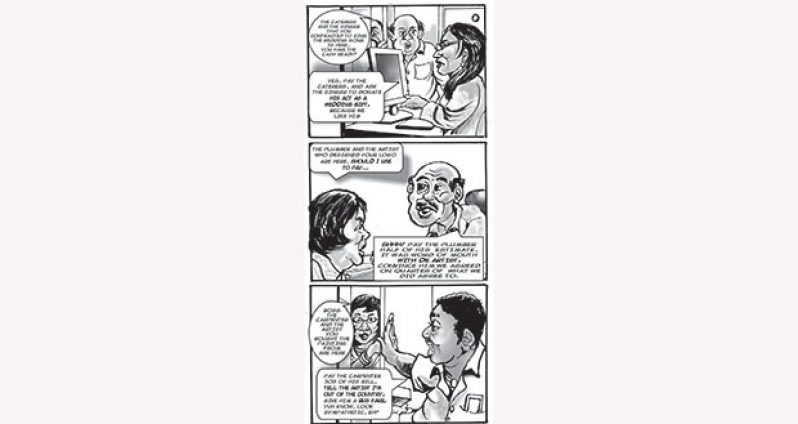IF the arts is indeed to impact on the economy as an earner of foreign currency, then there has to be an elevation in awareness of the relevance of the arts to all levels of development. The current perception of ambiguousness has to change; the mystery of this local mindset has a dual explanation that is translated as follows:
My father was a contractor/furniture producer. In one of his many lectures to me, I was scolded because I was given a sketchbook to learn furniture design, and I drew a skit, based on my own interpretation of Dr. No, the James Bond movie, plus some D-Day stuff.
My Dad’s [whom I didn’t grow up with]’s contention was that I would starve in Guyana if I chose art as a career; that I would have to go abroad to earn a living in art.
That dual perspective has persisted; though much work has been done post-Independence, there still exists a fossilised inferior complex concerning the existence of the artist in the invisible caste system in the Guyanese consciousness that has to be positively mutated.
A CASE IN POINT
Some years ago, a friend from the Lions invited me to help him manage a poster competition for primary school children. He took me to Enterprise Primary School at D’Urban Backlands. The children were eager, even excited; but I had to eventually ask the teacher if they did art at the school. She responded with an all-knowing answer, that they [her students] didn’t need to do art at the primary level until they went on to secondary school.
I was astonished, but cautioned by my colleague not to push it. We both concluded that the stage for the development of the imagination was at the primary level.
A student (a friend’s son) once told me that while at secondary school, he had an encounter with a similar teacher who entered his pre-CXC class and said to him and his colleagues, “Oh, you’re the Arts Stream! I’m not going to expect much from you.” That teacher didn’t stay long, but I’m sure she’s somewhere else in the system doing damage.
INTELLECTUAL FLAW
That intellectual flaw was somewhat clarified for me when I had a conversation recently with veteran artist, Stanley Greaves about this problem about the arts being used opportunistically, then dismissed by the bureaucracy.
He explained that when the Burrowes School of Art was launched, it carried a general art curriculum; and one of the ideas advocated was an ‘art appreciation’ syllabus for the school system.
This was rejected by the education administrators of that day; thus, the vacuum that exists today has only deepened.
Today, however, we do have an opportunity to influence a process that has left us behind the Caribbean. We hold on to the pittance of piracy and miss the volume of human talent; geographic and collaborative potential that can be explored and exploited.
The arts and its practitioners are fragmented, due to the lack of positive engagement from the overall State and private sector collective.
But these fragmented bodies rest on tremendous potential which cannot be activated, because it has not been recognised that they are burdened by R&D costs, which are demanded to meet the standards of competitive content.
Every other industry receives and demand bailouts in the billions as soon as they feel feverish.
ARTISTIC BAILOUT
The arts would require, for the first time in its history since Independence, an infusion off less than 1 % that it has taken the State, at any disbursement period over the last ten years, to keep GuySuCo alive.
At the only meeting we [The arts community at a limited level] had with the honourable Madam Minister of Culture, we were advised that it was preferred that we approach her office to negotiate for any financial interaction as groups.
The fact is that in its fragmented state, many varied sections of creative economics are at an individual state, with the required support talent not even receiving the training at our local institutions at this moment.
But, singular ideas have generated industries, whether one looks at science or the arts; and they are not different in the mystery of currents that flow through the brain.
The precedents are glaring all around us, from the alchemists of ancient Khemet to Leonardo da Vinci’s machine designs.
The souls in the arts have not chosen their careers because it was easy; there’s an opinion that one can bluff one’s way in the arts. This is not true.
Last Friday evening, I saw three talented actors perform Paloma Mohamed’s ‘Benjie Darling’ at the Theatre Guild. You can’t get up there on the stage and not be gifted with something special. I’ve seen bluff; and it’s always transparent.
There are movements afoot, which, for the first time, will include inputs from the cultural-industry community.
Finances coming into this country should involve our participation; the time is now to extend that hand of trust, indicating that we don’t have to stand only on our self-driven, self-financed achievements.
Pay an entitled budgetary attention to us on our merits! Perhaps that would give life to the image of the arts in the bureaucratic valley of bones.



.jpg)








